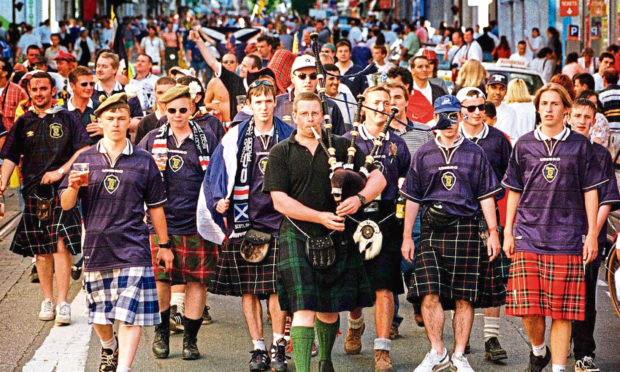We enjoyed a lovely dinner a few nights ago at a country house hotel on the banks of the River Dee in Aberdeenshire. It was bustling with guests lapping up various discounted promotions – a lifeline to keep the hospitality industry afloat in these dark days.
It was obvious that plenty of people were desperate to be served a slice of “normality” despite distancing and restricted licensing rules. It worked a treat as everyone behaved impeccably, but it seemed unfair that this business was having to look over its shoulder in fear that Aberdeenshire was about to be forced into a higher control tier. Their sensible and firm localised approach to keeping people safe seemed to work.
At about the same time as I was pouring whisky-infused blue cheese sauce on to my fillet steak (my wife’s treat, I don’t do this every day) a much different scene was playing out in an emergency “pop-up” bar a few miles away.
In the centre of Aberdeen there was a joyous outpouring as Scotland secured a place in the European Championship finals. But it was a spectacular own goal for social distancing and public safety.
Now the hospitality industry is again feeling the inhospitable force of the public’s wrath. The match was screened at the bar despite what appears to have been misgivings in certain official circles.
It was like the good old days – fans full to the brim with emotion and infused with booze hugged, cheered and sang or shouted in each other’s faces. They resembled a surreal Covid-19 convention for propagating the virus in the fastest time possible.
The irony is that fans are banned from attending matches in stadiums, but it’s OK to invite a football crowd into the tight confines of a bar to watch a live match and drink lots of lager. The end result was easier to predict than the match itself.
We display a natural desire to support hospitality on its very unsteady feet due to its economic importance, but many would rather shut repeat offenders. It seems bar staff are often forced to turn a blind eye or just pray drinkers behave themselves.
The last hospitality breach similar to this in Aberdeen brought a serious Covid-19 spike and temporary lockdown. People will be holding their breath to see if the same happens again after the fiasco of allowing football matches to be screened in bars.
The trouble with Ms Sturgeon’s punishment lockdowns is that even although they are meant to protect, they also damage a majority of law-abiding people who had nothing to do with the breach in the first place. All it needs is another bar-related spike spreading around the city and we could all be propelled into a Christmas lockdown. The public then quite rightly questions why bars were allowed to show televised matches in the first place.
It’s not just about being clever after the event. It should have been obvious that opening the floodgates to disorder would follow unless it was managed tightly in every detail. Instead, we hear feeble explanations from one of the bars in question that they “misjudged” what might happen. It was like lighting blue touch paper and waiting for sparks to fly.
By the time Scotland are negotiating group matches in the championships next year, a vaccine and improved testing might have moved the goalposts. If not, how can they continue to televise these matches in bars – or at least without much stricter controls? The hospitality industry has been arguably the worst-hit, along with travel, but some within it are in danger of pouring public sympathy down the drain like stale lager. And Aberdeen City Council, which has been huffing and puffing about how to crack down in the wake of this breach, needs to take a long, hard look at itself.
It seems to me that city officials and licensing committees fell over themselves to open bars again after the initial UK-wide lockdown. Bars in gardens and streets, pop-up tents – anything was possible to reopen hospitality with what appeared to be indecent haste.
It seemed that any localised public backlash about questionable licensing decisions would not be allowed to override economic necessity.
Since then the council has been inundated with complaints after another bar was allowed to open a beer tent in a quiet residential area on the outskirts of Aberdeen. The trend to delegate powers to officials, which erodes normal local democratic processes, has negative consequences. It’s time for the public to “take back control”, to coin a phrase.
Well-run bars and local government processes don’t happen by chance. They are built on strong sensible management and public respect – when one is out of kilter with the other, disaster awaits.

